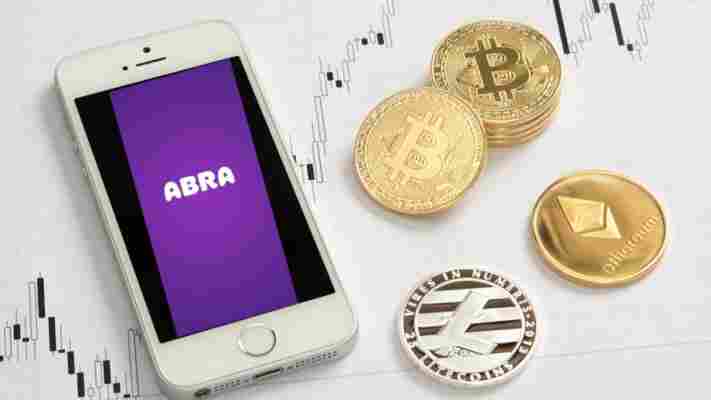Cryptocurrency exchange and wallet service provider Abra has just announced the launch of a new way to invest in traditional stocks, commodities, indexes, and ETFs using Bitcoin. Only it’s not as simple as it sounds.

In what it’s claiming is a world first, Abra is adding new investment features to its app that will allow investors in over 155 countries to invest in 50 traditional stocks.
Before you go thinking this is something groundbreaking, consider that it’s a world first on the basis that it’s being offered on a global scale, and because Abra offers more cryptocurrencies and fiat currencies than any comparable app.
With Abra’s new features investors will be able to buy fractions of shares in the likes of Facebook, Apple, Amazon, Google. Or buy shares of ETFs like Vanguard Growth, and indexes like the Russell 2000, all using Bitcoin of course.
Investments can start from $5 worth of Bitcoin and there are zero trading fees for the rest of 2019 if you sign up to early access .
It might sound simple enough, but it’ll help to know how Abra is doing this before you even consider looking at making stock investments.
If you were wondering how Abra makes money doing this, it charges a spread when cryptocurrencies are exchanged. This is effectively a fee based on the difference between the lowest and the highest selling prices of a given asset at the time of trading.
What’s going on?
Abra is offering these investments through using what it calls “synthetic currency.” Strap yourselves in, because this is about to get confusing.
When you put money into the Abra app, your dollars are immediately converted into Bitcoin, only the app will continue to display that your account has dollars sitting in it.
If the price of Bitcoin goes down, your balance will still display the amount of dollars you invested. Abra makes sure of this by hedging your investment in a wonderfully complex and unexplainable way, but I’ll give it a shot.
Basically, the Bitcoin equivalent of the dollars in an Abra account are borrowed from a broker, sold on to another broker for dollars, and that amount is held in an escrow account. That amount will match the money in your Abra wallet.
If the value of Bitcoin goes down – remember your Abra wallet’s dollars are actually backed by Bitcoin – Abra will add the Bitcoin required to maintain your balance. If you want to withdraw your dollars, Abra will buy the required amount of BTC using the dollars that were initially placed in escrow, to ensure you get all your money back.
As the value of BTC is now lower than when you bought it, your original investment (that was matched in escrow) can buy back the required amount to ensure your original dollars can be withdrawn from your account.
I thought we were supposed to be making cryptocurrency simpler?
Using Abra to invest in stocks
A similar thing happens when you use Abra’s new functionality to invest in stocks too.
Let’s pretend that you decide to invest $1,000 in Apple shares, Abra will place $1,000 worth of Bitcoin pegged against the price of the Apple shares. “As the price of Apple goes up or down versus the dollar, Bitcoin will be added to or subtracted from your contract,” an Abra spokesperson told Hard Fork.
“When you decide to close the contract and sell the Apple investment, the value of the shares will be [reflected] in Bitcoin in your wallet,” they added.
Despite the complexity of what’s going on underneath, profits and losses are dictated simply by whether a share appreciates or depreciates in value. How much profit you make or lose will depend on the specific investment you make.
From a user experience point-of-view, it’s very simple. You put money in, chose something you want to invest in, and wait to see what happens. Hopefully you’ll make a profit.
In reality, what Abra is offering feels more like what trading apps like BUX or Plus500 provide. It should be noted that most users who invest using these apps lose out. In some cases, investors have lost thousands of times what they originally invested.
While Abra might be taking on the headache of translating complex trading instruments into a simple, easy to understand app which could theoretically benefit users and open a previously hidden world to many people, it’s not without its risks.
This is not trading advice. As with any financial instrument do your own research and consult a registered, independent financial advisor before parting with any money.
This startup is putting degrees on the blockchain to beat fake diplomas
Fake diplomas and embellished work experience are a bigger problem than you might realize. There are a growing number of websites offering counterfeit degree certificates, from made-up universities. BBC research found one website had made over 200,000 fake certificates in 2015, making over £37 million in the process.

What’s more, the e-learning market is booming. It’s expected to be valued at over $300 million dollars by 2025. Yet its qualification award system is fragmented, insecure, and difficult to verify. How can hiring employers trust people have actually completed the online courses they claim to?
Well, a new startup hailing from Palo Alto is facing these challenges head on, and it’s doing it with the blockchain. Founded by Berkeley Blockchain Lab co-founder Steve Chen, EchoLink is aiming to be the first company to use the decentralized technology to create a platform that can verify university degrees, employment history, and other professional credentials.
EchoLink believes the blockchain can help build institutional trust, by using the blockchain’s immutability and time stamping functions. Their EkoLink Service is trying to provide employers and recruiters with trusted information about a person’s employment history, their degree, and other skills they may have gained over the course of their career.
EkoLink Service does this by enabling recognized institutions like universities, employers, educators, and training services to upload source-verified credentials about an individual after they successfully obtain a new qualification. The information will be time stamped and any changes that are made to a qualification are linked to creating a historical chain of education.
To try and create a truly international decentralized system, open to the world, EchoLink has chosen to run on more than oone public blockchain — Ethereum and NEO to be specific.
So how does it work?
Say a student graduated from Harvard University with a degree in International Business in July 2014. Afterwards, they went on to work for a tech startup in San Francisco from August 2014 until September 2016, and then went back to study an MBA at London Business School until September of the following year. Let’s also assume they did some vocational training during their career, like learning to code.
On EkoLink, Harvard could upload the degree certificate, what was achieved, and when it was awarded. The San Francisco-based startup could upload the job title, responsibilities, and when they joined and left their business. London Business School could upload the MBA qualifications. And the online academy, could verify what coding courses were completed.
Ultimately, when this information is used by employers from all over the world, they can trust it hasn’t been embellished, inflated, or illegitimately adjusted.
While EchoLink can store grades, degrees, and certificates in a protected and secure blockchain-based platform, it’s also developing a platform to provide these documents to employers to help people find jobs and get paid..
EchoLink’s payment system uses its Eko token to incentivize education institutions to upload credentials about its students. Hiring business can use EchoLink to find appropriate candidates, paying a fee to access their full list of credentials. These fees are then used to reward the institutions that upload information about their students.
The theory goes that because the information stored on EchoLink can be trusted, it’s more valuable than a possibly-embellished, self-written CV; in the long run it’ll be cheaper for the hiring business in that it saves time and resources to find the right candidate. It also reduces the risk of hiring someone who isn’t fully equipped for the job.
This Canadian town is letting residents pay taxes in Bitcoin
A small town in Canada, just north of Toronto, is joining Ohio in providing its citizens with an option to pay some taxes in cryptocurrency – Bitcoin, to be exact.

The town of Innisfil will begin accepting Bitcoin as payment for property taxes in April, local news outlet Simcoe . According to the report, Innisfil is the first municipality in the North American nation to offer citizens the option to pay in cryptocurrency.
“Once again, we are proud to be first in taking this bold step by offering this new, exciting payment option to our residents,” Innisfil Mayor Lynn Dollin said in a statement.
Indeed, this is not an outright integration of cryptocurrency payments yet, but a one-year trial period.
When residents log on to Innisfil’s website they will be presented with a new option to pay in Bitcoin. The report states that other cryptocurrencies like Ethereum, Litecoin, Bitcoin Cash, and Ripple could be added at a later date.
It should be noted that the municipality isn’t technically receiving payments in Bitcoin, though. The town is partnering with a third-party payment provider that converts cryptocurrency to fiat.
Though residents can pay their taxes in Bitcoin, the system will convert the funds to fiat and forward them to the town.
The main advantage appears to come if you normally pay taxes with a credit card which would be subject to a “convenience fee,” according to the Innisfil municipality website . Using Bitcoin, this fee is reduced by half, according to the payment provider.
That said, you could always pay taxes through your bank, directly in person or with a cheque – avoiding the fees altogether.
If the trial is successful, Innisfil could join Ohio as another municipality that accepts tax payments in cryptocurrency .
It will be interesting to see how many people take Innisfil up on this new payment option. Particularly when companies like Microsoft and Steam have lost interest in supporting Bitcoin as a payment option due to poor uptake.
Did you know? Hard Fork has its own stage at TNW2019 , our tech conference in Amsterdam. Check it out .











